Exploring the Importance of Automotive Window Seals in Enhancing Vehicle Comfort and Performance
The Importance of Automotive Window Seals
Automotive window seals are a crucial yet often overlooked component of vehicle design. These seals, typically made from rubber or other flexible materials, play a vital role in ensuring the durability, safety, and comfort of a vehicle. While they may seem like simple additions, automotive window seals serve multiple essential functions that are integral to the overall performance of a vehicle.
Firstly, automotive window seals are primarily responsible for providing a barrier against the elements. They prevent water, dust, and air from infiltrating the vehicle's interior. By forming a tight seal around windows, these components help maintain a dry and clean cabin, which is particularly important in regions with heavy rainfall or fluctuating weather conditions. Water leaks can lead to mold growth, bad odors, or electrical issues within the vehicle, making effective seals crucial for long-term vehicle maintenance.
In addition to keeping the elements out, automotive window seals also contribute significantly to the vehicle's insulation. A good seal reduces wind noise and enhances the driving experience by providing a quieter cabin. This is particularly relevant in luxury vehicles, where a serene atmosphere is part of the overall driving experience. Additionally, having well-functioning seals helps maintain interior temperature by minimizing the effects of outside air. This not only contributes to passenger comfort but also enhances the efficiency of the vehicle’s heating and air conditioning systems, potentially improving fuel economy.
automotive window seal

Safety is another major concern where automotive window seals come into play. These seals are responsible for holding the windows securely in place, which is critical during accidents. A well-sealed window is less likely to detach upon impact, reducing the risk of injury from shattering glass. Furthermore, the stability provided by these seals ensures that the vehicle’s structural integrity is maintained, which is essential for occupant protection.
Moreover, automotive window seals are also designed to be resilient against UV rays and temperature fluctuations. Over time, exposure to sunlight can cause rubber materials to degrade, leading to cracks or brittleness that compromise their effectiveness. Manufacturers continually refine seal materials to enhance their durability and performance in varying environments. For instance, advanced polymers and additives are often used to extend the lifespan of these seals and maintain their flexibility, which is crucial for their functionality.
Another noteworthy aspect of automotive window seals is their role in aiding the manufacturing and assembly process. Properly designed seals not only ensure a good fit between glass and the body of the car but also streamline production. By implementing efficient sealing technologies, manufacturers can reduce assembly time and costs while enhancing product quality.
In conclusion, automotive window seals are far more than mere accessories; they are fundamental components that influence various aspects of vehicle performance. From providing protection against the elements and enhancing passenger comfort to ensuring safety and durability, these seals hold significant importance in automotive design. As technology continues to evolve, innovations in seal manufacturing and materials will likely lead to even more efficient and effective solutions, ensuring that automotive window seals remain a critical part of the driving experience for years to come. As consumers, understanding the importance of these components can help us appreciate the intricate engineering that goes into every vehicle, reminding us that even the smallest details contribute to the overall quality and safety of our daily drives.
-
Silicone Seal Strip: The Ultimate Solution for Your Sealing NeedNewsNov.01,2024
-
Keep the Heat: The Importance of Seal for Oven DoorsNewsNov.01,2024
-
Essential Guide to Corner Protectors for Your FurnitureNewsNov.01,2024
-
Enhance Your Home with Silicone SolutionsNewsNov.01,2024
-
Efficient Maintenance of Melamine Sealing StripsNewsNov.01,2024
-
Comparison of Different Edge Sealing ProcessesNewsNov.01,2024
-
Types of Door Bottom Seal Strips and Their Best UsesNewsOct.25,2024